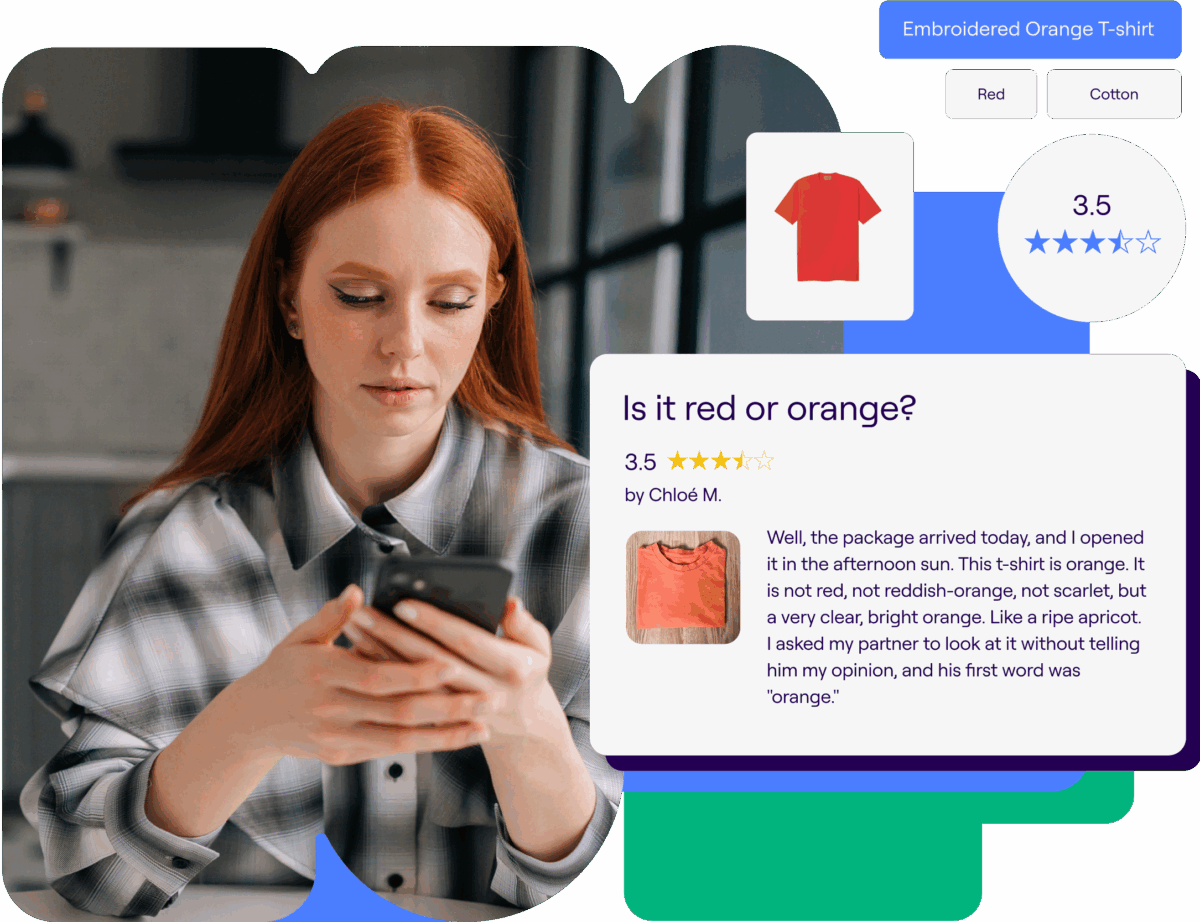Today’s shoppers demand more than price tags. From accurate product data and personalized experiences to transparency around values, see the insights driving smarter buying decisions—and how businesses can use them to deliver meaningful customer experiences that last.

Table of Contents
Keywords
Halloween is just around the corner, bringing with it ghouls, ghosts, and all kinds of supernatural fun. But the one spooky power that stands out the most? Mind-reading. Imagine being able to hear people’s thoughts, to instantly know what they like, dislike, and what they’re searching for! It’s a trick anyone would love to master, especially businesses.
Because in reality, knowing what customers want often feels more like a dream than something you can actually achieve. A Deloitte study uncovered a striking perception gap: while 80% of business leaders believe shoppers are impressed with the online shopping experiences they provide, fewer than half of consumers agree. And when it comes to in-store shopping, the disconnect is even wider—by 12 percentage points. There’s a gap between what brands think they deliver and what customers actually experience. And closing that gap has never been more critical.
The real question is: what do shoppers truly want to know before they buy? And how can businesses use those insights to close the gap between perception and reality?
Customers want clear information on a range of topics, but as a business, it can be tricky to know what customers are actually looking for and what they consider to just be marketing fluff. Luckily, the team here at Akeneo ran a survey of real consumers to gain a better understanding of what they’re looking for.
Here are the key things shoppers really want to know before they buy:
Before buying, shoppers want to feel absolutely certain about what they’re getting. The basics like price, size, and technical specs are usually present, but too many important details still slip through the cracks. Sustainability commitments, allergen information, and supply chain transparency are often missing, leaving shoppers with more questions than answers. When information is incomplete, hesitation creeps in, and trust in the brand begins to erode.
When these types of information are missing, the impact is huge. Two-thirds of consumers said they abandoned a significant purchase in the past year because product information like those mentioned was missing or inaccurate. That’s customer frustration as well as lost revenue.
This is where a solution like Akeneo Product Information Management (PIM) can make a big difference. By centralizing product data into a single source of truth, teams can catch gaps, automate repetitive tasks, and enrich product details for consistency across every channel. The result is accurate content that reduces returns and helps customers make informed choices faster.
As consumer expectations climb, the stakes only get higher. Brands that view product content as central to the customer experience will be the ones to win loyalty. Investing in accuracy and detail is a driver of long-term growth.
Shoppers today navigate a non-linear path to purchase, jumping from one channel to another before deciding to buy. They might begin with a quick Google search, compare details on an online marketplace, check reviews on social media, and finally walk into a store to see the product in person. Our survey demonstrates just how fragmented the journey is: 30% of consumers shop in general and specialty retail stores, 27% turn to online marketplaces, 26% rely on traditional search engines, and 22% use marketplaces specifically for product discovery. With so many different entry points, consistency in product information becomes critical. When details change between touchpoints, it raises doubts and undermines trust.
But managing product data isn’t enough on its own. It also needs to evolve with shopper behavior. With PX Insights, part of Akeneo Product Cloud, real signals like search performance and AI-driven rankings are turned into actionable insights directly inside the PIM. This allows businesses to adapt content in real time and respond to customer feedback quickly. By closing that feedback loop, companies deliver smarter product experiences that feel connected and relevant across every channel, strengthening shopper trust.
When customers trust what they see, they’re more likely to complete purchases, less likely to return items, and more inclined to engage with the brand again. In a world where consumers bounce between multiple touchpoints before making a decision, consistency isn’t optional, it’s the foundation of long-term loyalty and brand credibility.
Returns are a customer inconvenience, and they represent a major operational and financial drain for retailers. According to the survey, nearly 40% of shoppers sent an item back last year because the product didn’t match its description. Whether it was a misleading photo, an inaccurate size chart, or vague technical details, the result was the same: disappointment and frustration.
Each return cuts into margins through restocking costs, lost shipping expenses, and wasted inventory. More importantly, it damages brand credibility. A shopper who feels misled is less likely to purchase again. The solution is straightforward, though not always glamorous: brands need to invest in consistent and accurate product data from the very beginning. When shoppers know exactly what to expect, they’re far more likely to keep their purchase, saving costs for the retailer and reinforcing trust with the customer.
While product details drive initial interest, convenience and service often determine whether customers will buy—and whether they’ll come back. Free delivery, simple return policies, and responsive customer support have moved from “nice extras” to baseline expectations.
The data from our consumer survey makes this clear: 38% of shoppers now expect free delivery, 33% expect free returns, and 28% expect an easy return process as part of the standard shopping experience.
This demand for convenience reshapes how brands must operate. A flexible, customer-first approach reduces churn, lowers operational friction, and signals respect for the shopper’s time and money. Even small service improvements, like clearer return instructions or proactive shipping updates, can turn a potentially frustrating experience into one that reinforces loyalty. Shoppers who feel a brand has made their lives easier are much more likely to stick around.
Price will always influence purchase decisions, but today’s consumers look for more than just a good deal. We found that values such as sustainability, ethical sourcing, and transparency often carry more weight than cost alone. Two-fifths of shoppers said they would willingly pay extra for products when a company communicates its values clearly, showing that shoppers are no longer simply comparing numbers on a price tag, but they are also evaluating the ethics and commitments behind the brand.
The problem most brands run into is that this type of information is hard to manage and hard to communicate, which is where a solution like Akeneo Supplier Data Manager (SDM) can come into play. Businesses can scale supplier data onboarding and ensure accurate information flows from the very start, meaning that they can confidently share sustainability commitments, compliance standards, and sourcing practices without friction. By collaborating better with suppliers and distributors, SDM helps companies keep their promises visible and consistent.
By weaving values into product content and storytelling, brands can resonate with consumers who are making decisions not just with their wallets, but also with their conscience. Clear communication of values helps companies differentiate in crowded markets and build emotional connections that outlast price wars.
Consumers want information as well as experiences tailored to them. Nearly half of those surveyed said they would pay extra for personalization, whether it comes through smarter product recommendations, targeted messaging, or customized offers. When customers feel that a brand understands their needs and preferences, the transaction feels more like a relationship.
Personalization also drives repeat engagement. Shoppers who receive relevant recommendations are more likely to explore additional products, increasing basket size and lifetime value. But personalization must be done thoughtfully. Generic or overly aggressive tactics can backfire, making customers feel like just another data point. True personalization means blending product content with customer insights to deliver experiences that feel genuinely helpful and human. Brands that strike this balance gain a significant competitive advantage in today’s crowded commerce landscape.
At the end of the day, all consumers truly want is confidence in their choices. Brands that consistently provide accurate product information and highlight brand values stand out in a crowded market. Done well, product content becomes the foundation for stronger, more connected customer experiences!
Success comes when businesses stop thinking in transactions and start thinking in trust. By investing in enriched product information, listening to customer feedback, and aligning with values that matter, businesses can deliver meaningful customer experiences that create repeat customers. Build on it, and you’ll avoid the tricks while reaping the sweetest treat of all—long-term loyalty.
Discover what global consumers revealed about their evolving expectations and why better product information, not just better tech, is the key to winning hearts, sales, and loyalty.
